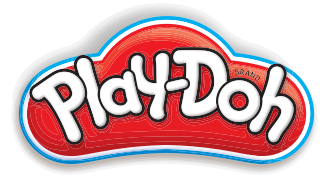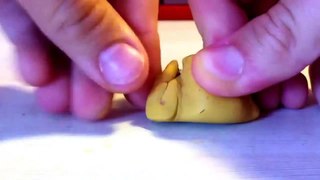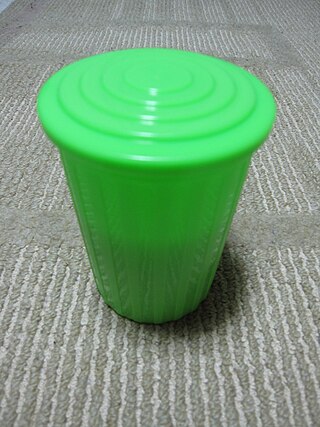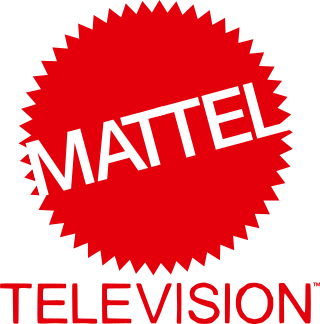
You Can't Do That on Television is a Canadian sketch comedy television series that first aired locally in 1979 before airing in the United States in 1981. It featured pre-teen and teenage actors in a sketch comedy format similar to that of American sketch comedy Rowan & Martin's Laugh-In and Canadian sketch comedy Second City Television. Each episode had a specific theme normally relating to the popular culture of the time.

Play-Doh is a modeling compound for young children to make arts and crafts projects. The product was first manufactured in Cincinnati, Ohio, United States, as a wallpaper cleaner in the 1930s. Play-Doh was then reworked and marketed to Cincinnati schools in the mid-1950s. Play-Doh was demonstrated at an educational convention in 1956 and prominent department stores opened retail accounts.

Double Dare is an American game show in which two teams compete to win cash and prizes by answering trivia questions and completing messy stunts known as physical challenges. It originally ran from 1986 to 1993. A revival ran in 2000, and the most recent revival ran from 2018 to 2019.

Hair coloring, or hair dyeing, is the practice of changing the hair color. The main reasons for this are cosmetic: to cover gray or white hair, to alter hair to create a specific look, to change a color to suit preference or to restore the original hair color after it has been discolored by hairdressing processes or sun bleaching.

Plasticine is a putty-like modelling material made from calcium salts, petroleum jelly and aliphatic acids. Though originally a brand name for the British version of the product, it is now applied generically in English as a product category to other formulations.
Rainbow Brite is a media franchise by Hallmark Cards, introduced in 1984. The animated Rainbow Brite television series first aired in 1984, the same year Hallmark licensed Rainbow Brite to Mattel for a range of dolls and other merchandise. A theatrical feature-length film, Rainbow Brite and the Star Stealer, was released by Warner Bros. in 1985. The franchise was rebooted in 2014 with a three part mini-series released on Hallmark's online streaming video service, Feeln. A line of new merchandise by Hallmark online and in its shops debuted in 2015.
Boglins were a series of toy puppets distributed by Mattel. They were created by Tim Clarke, Maureen Trotto, and Larry Mass, and licensed by Seven Towns. The original run of Boglins was released in 1987, coinciding with a "creatures" craze that included Ghoulies, Critters, and Gremlins. Boglins were goblin-themed hand puppets made of flexible rubber and could be manipulated to represent speech and facial expressions. Several series of large and small Boglins were released until 1994, with additional aquatic, Halloween, and baby themed Boglins released later into the line. Small solid 'Mini-Boglins' were also produced, akin to the Kinkeshi figures also from the 1980s.

Fimo is a brand of polymer clay made by German company Staedtler. Fimo is sold worldwide. Its main U.S. competitor is the American brand Sculpey. The material comes in many different colors; there are many finishes to choose from, and even a softener to use with it because it can be hard to work. It is used for making many objects, including jewelry, accessories, and small ornaments. Once shaped, Fimo is baked in a standard or toaster oven for about 30 minutes at 130 °C (265 °F) to harden it. Once baked, it can be cut, drilled, painted, sanded, and sliced thinly. According to information from Staedtler, Fimo contains polyvinyl chloride (PVC), but has not contained any phthalates since 2006.

Nickelodeon Studios was a production studio and theme park attraction run by the television network Nickelodeon at Universal Studios Florida.
Thingmaker, also called Creepy Crawlers, is an activity toy made by Mattel, beginning in 1964. The toy consists of a series of die-cast metal moulds resembling various bug-like creatures, into which is poured a liquid chemical substance called "Plasti-Goop", which comes in assorted colours. The mould is then heated to about 390 °F (199 °C) in an open-face electric hot plate oven. The Plasti-Goop is cured by the heat, and when cooled forms semi-solid, rubbery replicas which can be removed from the mould.

Jakks Pacific, Inc. is an American company that designs and markets toys and consumer products, with a range of products that feature numerous children's toy licenses. The company is named after its founder, Jack Friedman, who had previously founded LJN and THQ and presided over the company until retiring as CEO and chairman after March 31, 2010, a month before his death on May 3, 2010.

Airheads is an American brand of the taffy candy owned by the Italian-Dutch company Perfetti Van Melle. They were created on August 7, 1985, by Steve Bruner. Airheads are available nationwide in the United States and Canada where the candy is available in 16 different flavors.

Gunge as it is known in the United Kingdom, or slime as it is known in the United States and most English-speaking areas of the world, is a thick, gooey, yet runny substance with a consistency somewhere between that of paint and custard. It has been a feature on many children's programs for many years around the world and has made appearances in game shows as well as other programming. While gunge mostly appears on television, it can also be used as a fundraising tool for charities, youth and religious groups. Gunge tanks have appeared at nightclubs and Fun Days. The British charities Comic Relief and Children in Need, supported by the BBC, have used gunge for fundraising in the past. In the U.S., slime is sometimes associated with Nickelodeon, even having several game shows revolving around it, such as Slime Time Live. It is also a key aspect of WAM or Sploshing Fetish.

Colorforms is a creative toy named for the simple shapes and forms cut from colored vinyl sheeting that cling to a smooth backing surface without adhesives. These pieces are used to create picture graphics and designs, which can then be changed countless times by repositioning the removable color forms. The name also refers to the specific registered trademark brand these products are produced under, as well as the company that manufactures the toys, Colorforms Brand, LLC.
Nickelodeon Splat City was a themed area inside of California's Great America (1995–2002), Kings Island (1995–2000), and Kings Dominion (1995–1999). It was based on many Nickelodeon shows, such as Double Dare, which had attractions that involved getting wet or messy.

Nickelodeon Splat! was a television block consisting of game show interstitials on Nickelodeon. It aired live from March 7, 2004 to August 17, 2004. A webpage created for the game allowed viewers to interact with the program while it was airing. It was the last show taped at Nickelodeon Studios at Universal Studios Florida in Orlando, Florida alongside another Nickelodeon show, Gamefarm, prior to its closure on April 30, 2005.

Slime was a toy product manufactured by Mattel, sold in a plastic trash can and introduced in February 1976. It consisted of a non-toxic viscous, squishy and oozy green or other color material made primarily from guar gum. Different variations of Slime were released over the years, including Slime containing rubber insects, eyeballs, and worms.

Jack Friedman was an American entrepreneur, businessman, veteran of the toy and video game industries, and a philanthropist. Regarded as an influential member in the toy and video game industries, Friedman founded the three toy companies LJN, THQ, and Jakks Pacific; LJN and THQ later switched focus to video games.
NickRewind was an American late night programming block that aired nightly over the channel space of TeenNick. The block showed reruns of mid-late 1980s, 1990s, and early-mid 2000s children's programming, mostly shows that aired on Nickelodeon during their original runs. Collectively under all of its various brands, TeenNick's overnight classic programming block ran from July 25, 2011 to January 31, 2022.

Mattel Television is the television production division of American toy and entertainment company Mattel, originally founded on 31 March 2016 as the successor to Mattel's earlier entertainment division, Mattel Playground Productions, under the name Mattel Creations.














